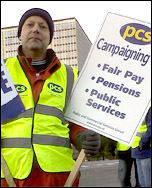Set dates for national strikes now
Coordinate on 30 November
Dave Semple, Wigan PCS branch secretary, personal capacity
The statutory strike ballot of PCS members, which ran from 26 September to 7 November, has secured the 50% turnout threshold for a legal strike under Tory anti-union laws.
Almost 100,000 members in the UK and devolved government areas have achieved a mandate for strike action. It must be implemented without delay!
A resounding 86.2% of members voted ‘yes’ for strike action, covering 126 different employers. This is a massive vote against the government’s plans to cut pay, jobs and offices; to attack public services and the terms and conditions of staff who deliver these services.
This ballot victory is testament to the phenomenal work put in by rank-and-file union reps and members across the UK who spent hours contacting every single member in their branches to make sure they voted.
Prepare for major strikes – including national, all-members action
The union’s national executive (NEC) met on Thursday 10 November. Many reps will have expected the union leadership to seek a meeting with the employer to discuss the union’s demands on pay and jobs, and to set dates for action right across the 126 employers.
In fact, they decided not to do this, but rather to write to the employer and reconvene on 18 November to discuss how and when to call action.
This decision to delay on action is a mistake. It is correct to use the mandate to demand talks. But to merely write to the Cabinet Office and not also immediately serve notice of action, fails to capitalise on the mood that exists amongst the membership.
It shows weakness, lets the government play for time, and crucially misses the opportunity to launch our campaign with all-members’ action along with other unions on 30 November.
Major coordinated action has already been announced by other unions, including 115,000 in the Communication Workers Union and 70,000 in the University and College Union, for late November. In London, this would allow striking Whitehall-focused Departments to link up with the major demonstration planned by UCU on 30 November, raising confidence in a key area for us.
Broad Left Network supporters have argued in favour of a strike uniting all areas with a legal mandate for action, joining up with those unions calling action at the end of November.
The disruption caused by this should then be built on if the employer does not meet or concede our demands. This should include national strikes as well as targeted and rolling action, linking up our members when there is industrial logic to do so, such as geographic proximity or common areas of work. Enough areas have voted for action that we have sufficient muscle to fight hard.
Instead, the NEC is downplaying the potential role of sustained all-members’ action, in favour of small-scale targeted action, which can be supported with strike pay. We disagree. National action covering all areas with a mandate to strike, in addition to the other kinds of action, is needed to exert maximum pressure on the government.
Re-ballots and action short of strikes
Even though the civil service areas with a mandate for action number around 100,000 members, there are big areas which do not currently have a mandate. The Revenue and Customs Group (HMRC) narrowly failed to get the 50% turnout, and it is understood they will be re-balloted in the New Year.
The union must consider all areas which did not break the threshold for a re-ballot, not just HMRC. Bold national action before re-ballots take place can have a big effect on the confidence of members in those areas that didn’t make the threshold this time, and can transform the outcome of re-ballots.
A question on action short of a strike was not included in the recent ballot. We believe this was a mistake. Members are not able to undertake an overtime ban or a work to rule in any area, despite the major leverage this could provide. We believe the union must urgently consider whether and when to ballot all areas for action short of a strike.
A strategy to win
Members have given the NEC an enormous mandate to prepare the union for a massive fight that could improve our pay, secure our pensions, protect our terms and conditions and defend our jobs and offices.
The current NEC has the responsibility to act on that mandate and quickly. It needs to immediately put forward a strategy of action which is capable of securing our demands. This should include:
- Periods of all-members action preferably with other unions, starting with an initial two-day strike at the end of November
- Extended targeted strikes
- A re-ballot of members in those groups which failed to get the 50% turnout threshold
- Ballots for action short of strikes
Such a programme is capable of mobilising members to win.







